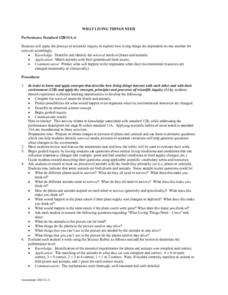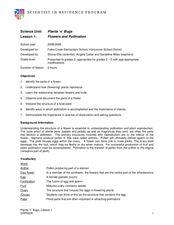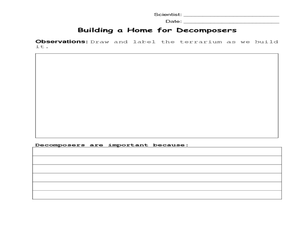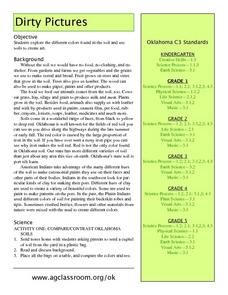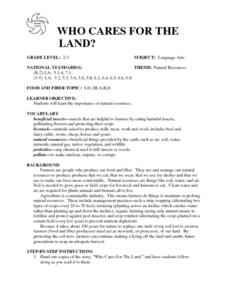Curated OER
Whitewater Canal State Historic Site
If you happen to live in Indiana, or a neighboring state, and are planning a field trip to the Whitewater Canal State Historic Site, then this lesson plan will suit your needs quite well. In it, suggestions for activities before, during,...
Curated OER
Plant Parts We Eat
I bet the kids in your class will love to eat their vegetables after an engaging lesson about edible plants. They read information about vegetables and edible plants, sort vocabulary words, identify plant parts, measure and graph the...
Curated OER
The Way a Tree Works
Students explore nature by conducting botany experiments. In this plant life lesson, students define the necessary resources for a plant to thrive on our planet while defining scientific vocabulary terms. Students utilize different plant...
Curated OER
What Do Snails Eat?
Students conduct a food choice experiment with snails, recording the results on a chart to determine what snails eat. In this what do snails eat lesson, students color a picture of snail anatomy, perform the experiment with 3 food...
Curated OER
What Living Things Need
Students apply the process of scientific inquiry to explore how living things are dependent on one another for survival. They match animals with their generalized food source. Students predict what happens to the organisms when their...
Curated OER
Pond Ecosystem Field Trip
Students investigate the environment by participating in a class trip. In this pond ecosystem lesson, students define a list of vocabulary terms associated with ponds such as invertebrate and metamorphosis. Students attend a field trip...
Virginia Department of Education
The Cycles of Nature
Encourage peer collaboration and assist with the creation of visual aids to identify carbon, water, and nitrogen cycles as your class learns more about nature. They discuss relative information, create a visual aid...
Curated OER
Classifying Living Things
Students identify how to classify living things. They classify various concepts including family members, kinds of clothing, numbers, shapes, and vocabulary words. They discuss how to classify various concepts and classify pictures of...
Curated OER
Let's Sort a Salad
Learners examine edible plants by identifying salad ingredients. In this botany lesson, students discuss the different vegetables that can be eaten in a salad and draw them on a worksheet. Learners review vegetable vocabulary and examine...
Curated OER
Flowers and Pollination
Students explore the environment by researching plant reproduction. For this pollination lesson, students define botany related vocabulary terms such as disc flower, petal and fertilization. Students dissect a flower with their...
Curated OER
De-composers - Terrarium
Learners explore the environment by building a mock ecosystem. In this rainforest analysis lesson, students define many environmental and rainforest related vocabulary terms and discuss the current status of our planet's rainforests....
Curated OER
Modeling Changes to Ecosystems Pt. 2
Students explore the environment by creating a poster. In this ecosystem protection lesson, students analyze a list of vocabulary terms associated with the scientific method. Students create a poster which answers a specific question...
Curated OER
The Chain Gang
Students perform a food chain simulation to determine what happens when a food chain is broken.
Curated OER
Dirty Pictures
Students investigate how food, clothing and shelter come from soil after they examine soil from their own backyards. They map soils on the color wheel before making glue and soil pictures and tie-dying T-shirts in red soil.
Curated OER
Winer Survival
Students study how animals need water, food, shelter, and space to survive. They also study what animals need to survive in the winter. They play the part of animals and winter "threats" in a game of tag to reinforce concepts.
Curated OER
Who Cares for the Land?
A very thorough lesson plan focuses on what plants need to grow and stay healthy. There are excellent reading activities and worksheets included in this fine plan. A terrific way to introduce a unit on plants and their needs.
Curated OER
Solid Waste Recycling
Students seek scientific and technological solutions to envrionmental problems. They record class activities in a journal. They identify relationships among living things and their environments.
Curated OER
Habitat Basics
First graders get out and explore two different habitats to examine how each one meets the needs of the plants and animals that dwell there. They discuss what they've learned about animal habitats as they explore the outdoor environment....
Curated OER
Ego Trip- Exploring the Inner Workings of the Human Body
Students gain an understanding of how systems and organs in the human body work. They create their own fictional account of a trip through the human body, and describe one response the body makes to stimuli.
Oklahoma Ag in The Classroom
Bee Smart Bee Happy
Here is a wonderfully designed lesson on bees and pollination designed for early elementary learners. After a class discussion on bees, pupils pretend to be a bee by picking up nectar off of "flowers" in the class. The flowers are...
Curated OER
Lesson Plan #3 ~ Ocean Currents
Sixth graders experiment to understand the ocean's currents. In this ocean current lesson, 6th graders complete an experiment with two bottles of water and an index card to discover information about the ocean current. ...
Curated OER
Water Works
Learners create a "water web" to illustrate the interdependence among water users and producers. They distinguish between direct and indirect uses of water; illustrate the interconnectedness of water users in a community; and demonstrate...
Curated OER
Sandwich Stratigraphy
Two activities are included in this resource. In the first, junior geologists model sedimentary rock layers, apply the Law of Superposition, and demonstrate folding and faulting of the Earth's crust. The model is technically a sandwich....
Cornell University
Buoyancy
Swimmers know to float by turning their bodies horizontally rather than vertically, but why does that make a difference? In an interesting lesson, scholars explore buoyancy and the properties of air and water. They test cups to see which...




